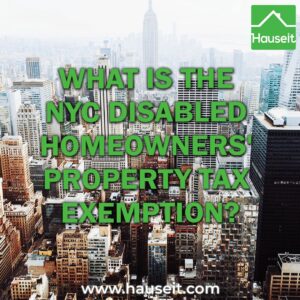The NYC Disabled Homeowners’ Exemption (DHE) is a property tax break of 5% to 50% for the primary residence of disabled New Yorkers with annual income of $58,399 or less. The tax break applies to condos, co-ops as well as one-, two-, and three-family homes.
The Disabled Homeowners’ Exemption works by reducing your qualifying home’s taxable assessed value by up to 50% based on your annual income:
-
Income between $57,500 and $58,399: 5% reduction in assessed value
-
Income between $56,600 and $57,499: 10% reduction in assessed value
-
Income between $55,700 and $56,599, 15% reduction in assessed value
-
Income between $54,800 and $55,699, 20% reduction in assessed value
-
Income between $53,900 and $54,799, 25% reduction in assessed value
-
Income between $53,000 and $53,899, 30% reduction in assessed value
-
Income between $52,000 and $52,999, 35% reduction in assessed value
-
Income between $51,000 and $51,999: 40% reduction in assessed value
-
Income between $50,001 and $50,999: 45% reduction in assessed value
-
Income between $0 and $50,000: 50% reduction in assessed value
The property must be used as a primary residence in order to qualify. However, your property may still be eligible if you are receiving in-patient care at a residential health care facility.

Except in the case of joint ownership by spouses or siblings, all owners must be persons with disabilities to qualify for the NYC Disabled Homeowners’ Exemption.
According to the Department of Taxation and Finance, “an applicant must have a physical or mental impairment, not due to current use of alcohol or illegal drug use, that substantially limits that person’s ability to engage in one or more major life activities, such as caring for one’s self, performing manual tasks, walking, seeing, hearing, speaking, breathing, learning or working.”
The total combined income of all owners and their spouses cannot exceed $58,399.
This includes all sources of income such as 1099s, W2s, Social Security benefits, pension payments, IRA and annuity earnings, capital gains, workers’ compensation, business income, rental income and interest.
The following items are excluded from the calculation of total combined income:
-
IRA distributions
-
Cash Assistance (Public Assistance)
-
Reverse mortgage proceeds (but any interest or dividends realized from the investment of such proceeds are income)
-
Supplemental Security Income (SSI)
-
Gifts, inheritances
-
Return of capital
-
Nazi persecution reparation payments
-
Federal Foster Grandparent Program payment





